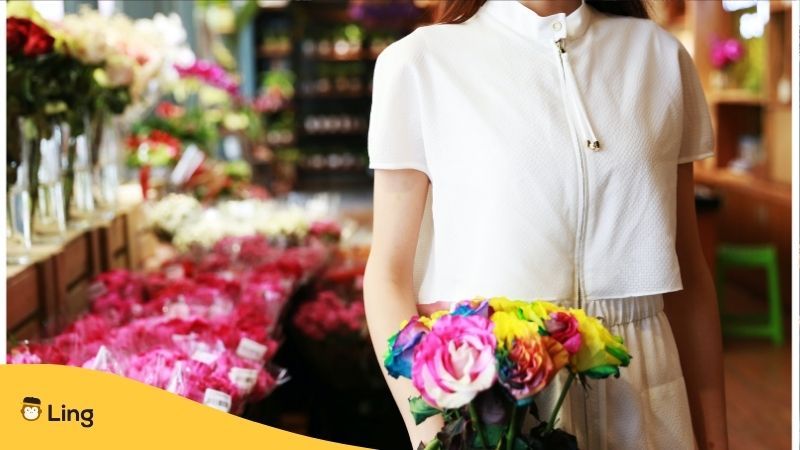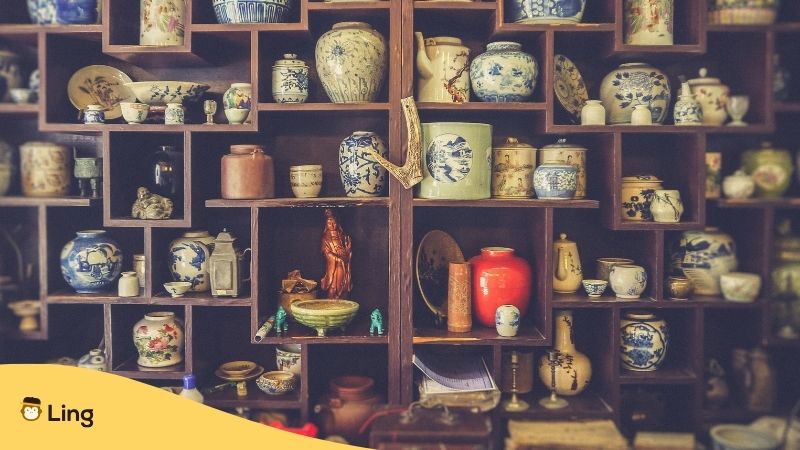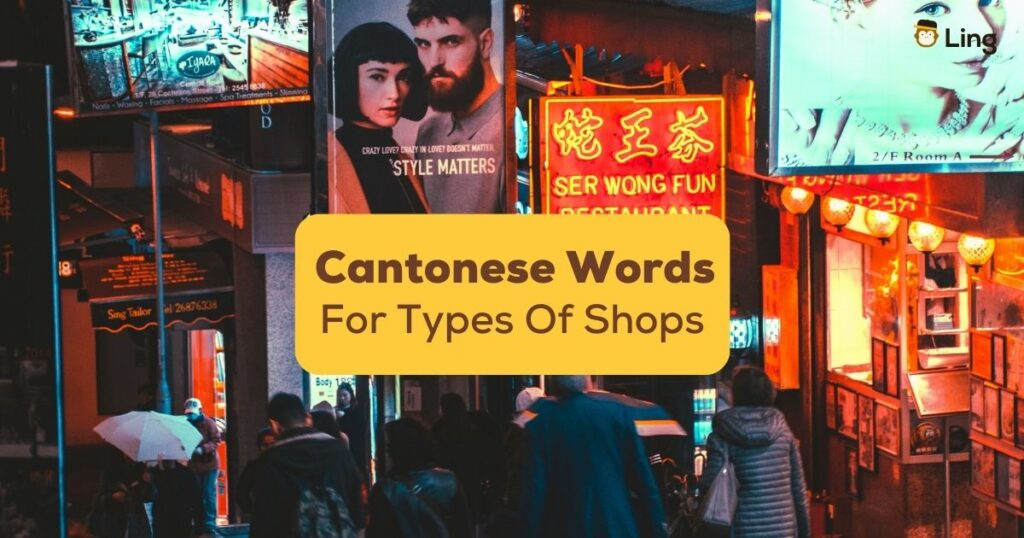As a contender for the title of most densely populated territory on the planet, Hong Kong is understandably packed with all manner of retail outlets, and knowing Cantonese words for types of shops is a useful skill when out and about in the former British colony.
From bustling markets to quaint boutiques, Cantonese has words and phrases for every shop under the sun. So let’s head out among the skyscrapers armed with essential Cantonese vocabulary for a bit of retail therapy.
Cantonese Words For Types Of Shops
Let us look at different Cantonese words for different types of shops and retail establishments.
General Shops – Chaa4 Chaan1 Teng1 (茶餐廳)
Before we dive into the specific types of shops, let’s start with a general term used for various establishments that serve food and beverages, such as restaurants, tea houses, and cafes. In Cantonese, such places are often referred to as Chaa4 Chaan1 Teng1 (茶餐廳), which literally translates to “tea restaurant.” These casual dining spots are a cornerstone of Chinese culture, offering a wide range of dishes, from traditional dim sum to Western-inspired fare.
Grocery Stores – Zaap6 Go3 Pou3 (雜貨舖)
In Cantonese, a typical grocery store is known as “zaap6 go3 pou3” (雜貨舖). The term “zaap6 go3” (雜貨) refers to a variety of goods or sundries, making it an apt description for a store that sells a diverse range of products, including fresh produce, canned goods, and household items. Cantonese-speaking communities worldwide rely on these shops for their daily needs.
Butcher Shops – Juk6 Pou3 (肉舖)
For those seeking fresh cuts of meat away from the freezers of the supermarket, Cantonese has a specific term, “juk6 pou3” (肉舖), to describe butcher shops. These establishments play a vital role in Cantonese cuisine, as meat is a key ingredient in many dishes, including barbecue pork (caa1 siu1 – 叉燒) and roasted duck (siu1 aap3 – 燒鴨).
Fish Markets – Jyu4 Si5 (魚市)
Seafood is integral to Hong Kong cuisine, so it’s no surprise that there’s a dedicated term for fish markets in Cantonese: “jyu4 si5” (魚市). These sprawling markets offer a vast array of fresh fish, shellfish, and other aquatic delights, ensuring that plates and bowls in Hong Kong restaurants are always a seafood lover’s paradise.
Fruit Stalls – Seoi2 Gwo2 Dong2 (水果檔)
In Cantonese-speaking regions, it is impossible not to stumble upon street vendors selling fresh fruits. These makeshift stalls are known as “seoi2 gwo2 dong2” (水果檔), with the Chinese words “seoi2 gwo2” (水果) translating to “fruit.” The vibrant colors and enticing aromas of these stalls are hard to resist, making them a popular sight in the bustling streets of Hong Kong and beyond.

Flower Shops – Faa1 Dim3 (花店)
Flowers hold a special place in Cantonese culture, symbolizing beauty, love, and good fortune. “花店” (faa1 dim3) refers to flower shops, where you can find a wide variety of blooms and arrangements for various occasions, from weddings to funerals.
Bakery – Min6 Baau1 Dim3 (麵包店)
Cantonese-speaking communities are known for their love of pastries and baked goods, and “min6 baau1 dim3” (麵包店) are the essential words used to describe bakeries. These shops offer an array of bread, cakes, and pastries, including the famous pineapple bun (bo1 lo4 baau1 – 菠蘿包).
Tailor Shops – Coi4 Fung4 Dim3 (裁縫店)
Cantonese is not limited to describing food-related establishments. “coi4 fung4 dim3” (裁縫店) refers to tailor shops, where skilled craftsmen create custom-made clothing for their customers to try on in the fitting room. These shops are a testament to the importance of sartorial elegance when strolling around the streets of Hong Kong and Guangzhou.
Electronics Stores – Din6 Hei3 Dim3 (電器店)
In the modern age of technology, Cantonese has adapted to include words for electronic stores. “din6 hei3 dim3” (電器店) encompasses shops that sell a wide range of electronic goods, from smartphones and laptops to home appliances.
Bookstores – Syu1 Dim3 (書店)
For the bookworms among us, Cantonese provides the term “syu1 dim3” (書店) to describe bookstores. These shops offer a vast selection of reading materials, catering to diverse tastes and interests.

Antique Shops – Gu2 Dung6 Dim3 (古董店)
Cantonese culture places great value on tradition and heritage, and this is reflected in the existence of “gu2 dung6 dim3” (古董店) or antique shops. These establishments house a treasure trove of vintage items, including furniture, ceramics, Mogwai, and artwork, allowing enthusiasts to explore the rich history of this region of China.
Jewelry Stores – Zyu1 Bou2 Dim3 (珠寶店)
For those in search of precious gems and fine jewelry, Cantonese offers the term “珠寶店” (zyu1 bou2 dim3). These stores showcase exquisite jewelry pieces, from dazzling diamonds to ornate jade designs.
Shopping Mall Or Shopping Center – Kau3 Mat6 Zung1 Sam1 (購物中心)
These large size shopping malls are temples for worshippers of designer labels and high-end brands. Hong Kong has a well-deserved reputation as a Mecca for those seeking out the latest fashions who have a bit of spare cash and don’t mind the sales tax.
More Cantonese Words For Types Of Shops & Shopping
Learn Cantonese Lessons With Ling
If you are looking for a language learning app to help you with your Cantonese, look no further than Ling app. With Ling, you will go from beginner to expert in no time. Ling covers all the essentials from reading and writing to conversation and culture. Download the app from the App Store or Google Play today!



































































